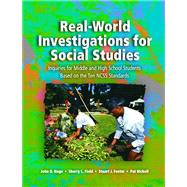
John D. Hoge is an associate professor of education at the University of Georgia, where he has taught for the past 14 years while engaging in curriculum development projects, research, and publication activities designed to promote effective elementary and middle school social studies education. Regarding the school uniforms case in chapter 6, he states, "It was a natural for me. It touched so many power, authority, and governance issues and related directly to the lives of the children and parents who experienced it."
Sherry L. Field is a Professor of Curriculum and Instruction at The University of Texas at Austin, where she is Program Area Head for Social Studies Education. She has recently served as Chair of the College and University Faculty Assembly of the National Council for the Social Studies, Chair of the Research in Social Studies SIG of the American Educational Research Association, and President of the Society for the Study of Curriculum History. Her research in social studies curriculum and learning has been published in journals such as Theory and Research in Social Education, Social Education, Middle Level Learner, The Educational Forum, and Journal of Supervision and Curriculum. Currently, she is editor of Social Studies and the Young Learner.
Stuart J. Foster is a senior lecturer at the Institute of Education, the University of London. He received his doctorate from the University of Texas at Austin. He has published widely on educational history and the teaching and learning of history and the social studies. His contributions in this book reflect his interest in the teaching of controversial issues, the politics of schooling, and the representation of ethnic groups in American education.
Pat Nickell is a former elementary teacher, school district administrator, and college professor. She served as president of the National Council for the Social Studies, 1996-1997, and has an extensive list of published articles, books, book chapters, and curriculum projects to her credit. She coauthored the NCSS Social Studies standards, Expectations of Excellence. She is currently a social studies consultant in the state of Florida.
| An Introduction to Contextual Teaching and Learning Methods | 1 | (5) | |||
|
|||||
|
1 | (1) | |||
|
2 | (2) | |||
|
4 | (1) | |||
|
4 | (1) | |||
|
5 | (1) | |||
| CHAPTER 1 Is America United or Divided by Language? | 6 | (29) | |||
|
|||||
|
6 | (1) | |||
|
7 | (1) | |||
|
7 | (28) | |||
| CHAPTER 2 Crisis at Blue Ridge Leather: The Intersection of One life with Historical Social Structures | 35 | (19) | |||
|
|||||
|
35 | (1) | |||
|
36 | (1) | |||
|
36 | (1) | |||
|
37 | (1) | |||
|
38 | (1) | |||
|
38 | (16) | |||
| CHAPTER 3 The Lake Lanier Land Use Controversy | 54 | (19) | |||
|
|||||
|
54 | (1) | |||
|
55 | (1) | |||
|
55 | (18) | |||
| CHAPTER 4 Getting a Job and Keeping It: Expectations in the Workplace | 73 | (14) | |||
|
|||||
|
73 | (1) | |||
|
74 | (1) | |||
|
74 | (1) | |||
|
74 | (1) | |||
|
75 | (12) | |||
| CHAPTER 5 Defusing Hate: With Malice Toward None, with Charity for All | 87 | (34) | |||
|
|||||
|
87 | (1) | |||
|
88 | (1) | |||
|
88 | (33) | |||
| CHAPTER 6 Mandatory School Uniforms: A Real-World Exploration of Power, Authority, and Governance | 121 | (28) | |||
|
|||||
|
121 | (1) | |||
|
122 | (1) | |||
|
122 | (27) | |||
| CHAPTER 7 Pirates! From the High Seas to High Tech: The Great Debate Over Music Piracy | 149 | (21) | |||
|
|||||
|
149 | (1) | |||
|
150 | (1) | |||
|
150 | (20) | |||
| CHAPTER 8 To Be or Not to Be: The Zoo Is the Question | 170 | (19) | |||
|
|||||
|
170 | (1) | |||
|
171 | (1) | |||
|
171 | (18) | |||
| CHAPTER 9 Confronting the Cycle of Poverty | 189 | (36) | |||
|
|||||
|
189 | (1) | |||
|
189 | (1) | |||
|
190 | (35) | |||
|
190 | (1) | |||
|
190 | (1) | |||
|
191 | (34) | |||
| CHAPTER 10 Connecting Students to Their Communities Through Service | 225 | (29) | |||
|
|||||
|
225 | (1) | |||
|
226 | (1) | |||
|
226 | (28) | |||
| References | 254 | (3) | |||
| Index | 257 |
The New copy of this book will include any supplemental materials advertised. Please check the title of the book to determine if it should include any access cards, study guides, lab manuals, CDs, etc.
The Used, Rental and eBook copies of this book are not guaranteed to include any supplemental materials. Typically, only the book itself is included. This is true even if the title states it includes any access cards, study guides, lab manuals, CDs, etc.